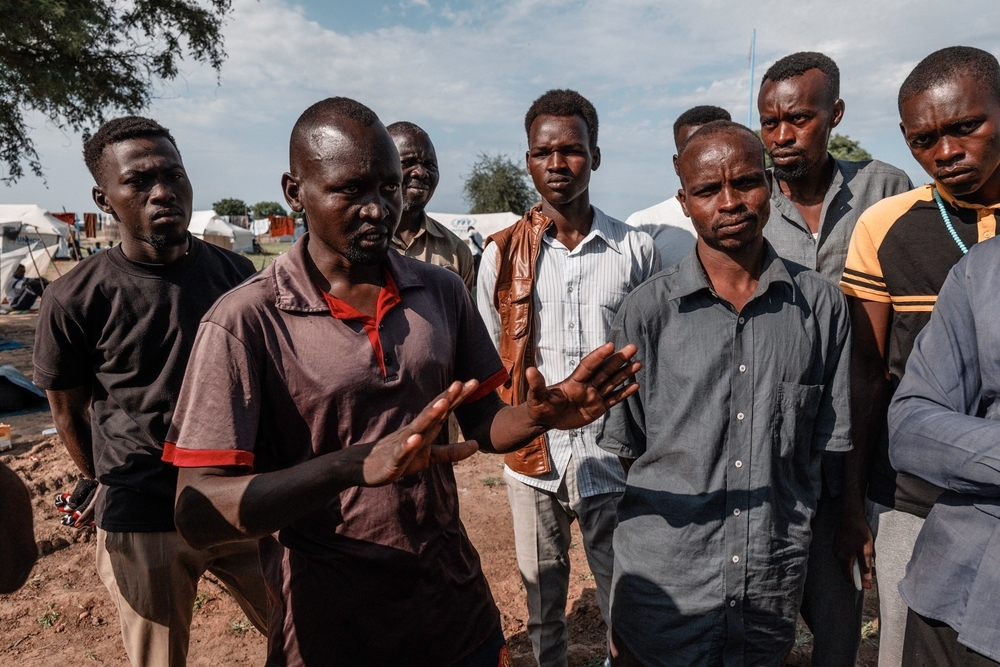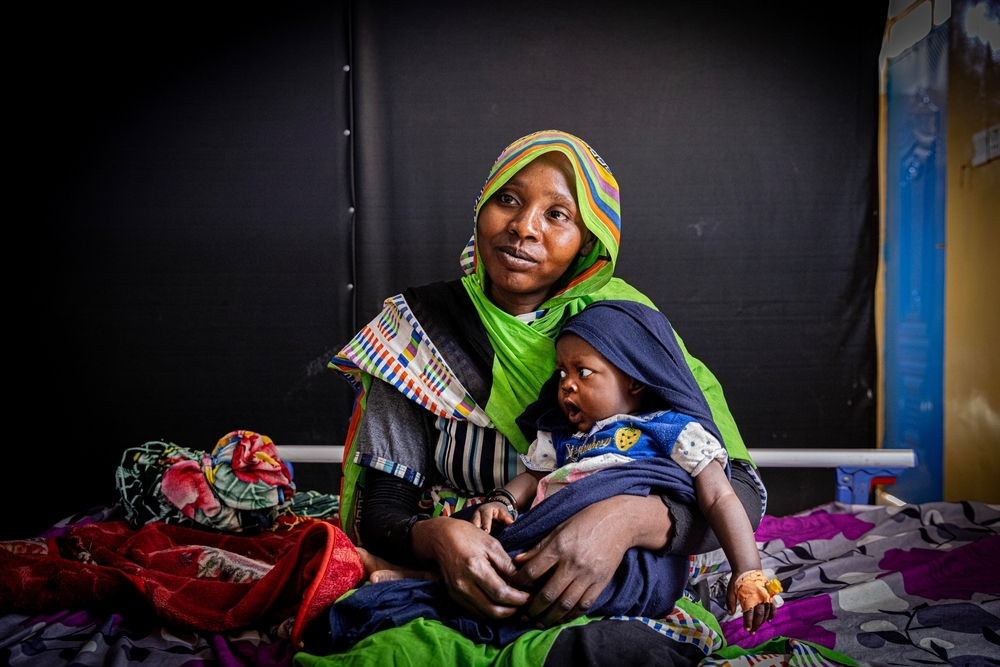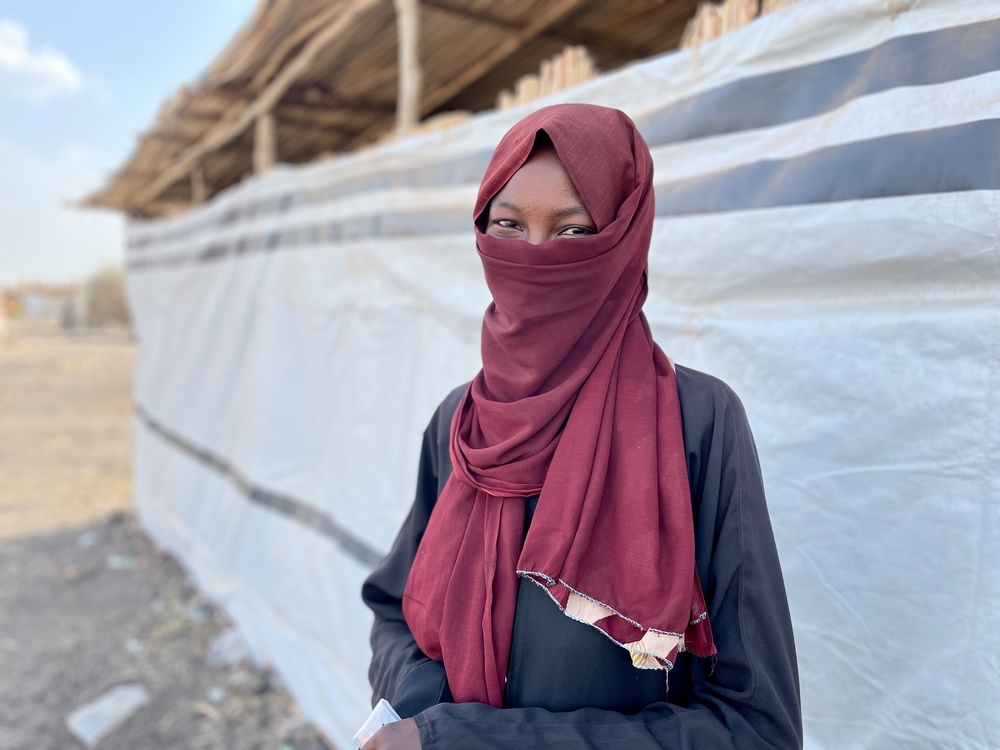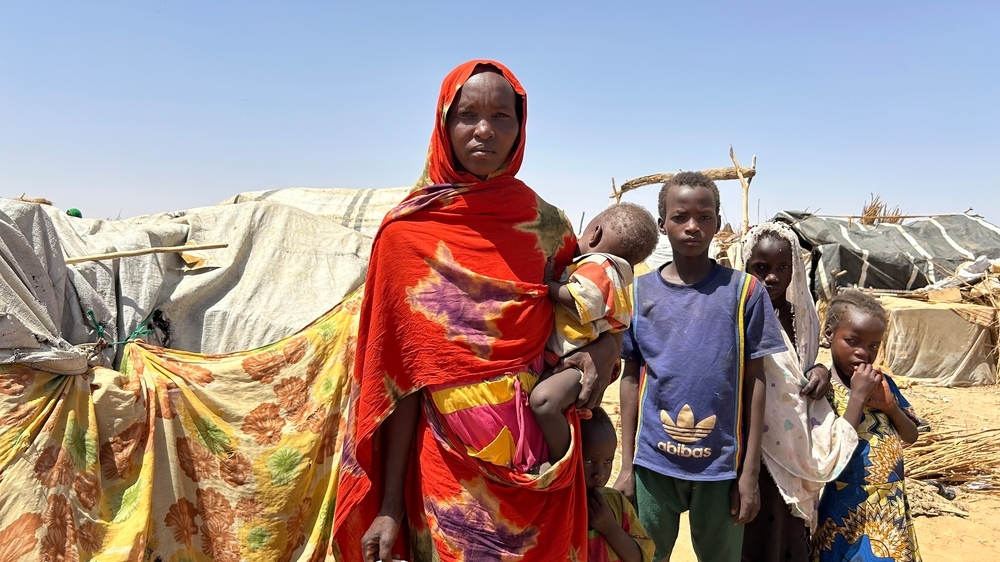One year of war: Testimonies from patients and staff from Sudan

1. Khadija Mohammad Abakkar, 25, patient from Central Darfur, Sudan
“We suffered a lot. For three days, we couldn't sleep. Now, where we are is also bad.
I’m Khadija Mohammad Abakkar, 25, I have been displaced by the war in Sudan. Five months ago, I was forced to flee my home in the displaced camp of Hasahissa, in Zalingei, Central Darfur, Sudan. I sought refuge in the displaced camp of Tululu, approximately one hour away from home.
When the problems started between SAF and RSF, I lived at the edge of the [Hasahissa] camp which is close to a military base. The militia would come into our homes and loot our belongings.
During the fighting, there was no access to health care or food in the camp. I sold my belongings to earn some money for food. Eventually, the security situation became too difficult, and I was forced to move to Tululu camp.
We suffered a lot. For three days, we couldn't sleep [in Hasahissa camp]. Now, where we are is also bad, because we don´t have enough food.

In Tululu camp, we don´t have access to health care me and my family. I traveled over an hour to Zalingei teaching hospital to receive treatment for my daughter Malaki, who tested positive for malaria at the hospital.
In Hasahissa camp [previous home], we would receive medication for free. Here in Zalingei, it´s not the same. But today [for the first time], we received medication for free.
MSF teams are supporting the Zalingei teaching hospital. On the 2nd of April, the hospital opened the newly refurbished emergency department, where MSF teams support the Ministry of Health staff with training and rehabilitation of the facility.
2. Chira Casah, 24, patients from Kosti, South Sudan
“Life in the camp is a stark contrast to our comfortable existence in Khartoum. Illness plagues my family.
My name is Chira Casah, a 24-year-old refugee from Sudan. Leaving Khartoum was a harrowing journey marked by desperation for medical aid for my thyroid disorder, which causes fever, dizziness, hormonal imbalances, poor sleep, and weight loss when untreated. Fleeing with my mother, brother, and sister, we lost contact with my father and two other brothers in the chaos of war. I hope they are still alive.
Life in the camp is a stark contrast to our comfortable existence in Khartoum. Illness plagues my family, necessitating frequent visits to the MSF clinic for assistance. Food and water shortages loom large, forcing us to scavenge for work to survive. You will just die from hunger if you don’t go out and try everything you can to work and get small money.
Once a university student studying animal protection, my dreams now seem distant amid the uncertainty of our future. Despite feeling like my family is unravelling, I cling to hope.
The onset of war, on April 15 a few days before Ramadan, trapped us in our home as violence escalated outside. With dwindling resources, we sold our possessions for survival, leaving behind loved ones as we fled from Khartoum to Kosti and finally to the transit centre here.
Life in the camp is harsh, with my mother and sister struggling to adapt to the environment teeming with flies, mosquitoes, rats, and wild animals. Kosti also feels like Khartoum in a way, insecurity and crime is high here. We plan on leaving to Joda then to Renk. This here is a temporary transit centre anyway.

3. Dr. *Ibrahim, General doctor from Khartoum, Sudan
“Now, I am in Khartoum, working amidst the sound of bullets and bombs. I miss my family dearly, but I know I have a duty to my country and its people.
I am Dr. *Ibrahim, and for the past two years, I have been a general doctor with Doctors Without Borders. My story starts in 2022, in a malnutrition ward at Al-Damazin Hospital. A year later, the war began, and I found myself in Wad Madani, the heart of the conflict.
In the early days, we watched the news unfold, seeing streams of displaced people making their way from Khartoum to Wad Madani. We set up field clinics in camps, offering whatever medical aid we could. But as we witnessed the exhaustion etched into the faces of the displaced, we realized their needs extended beyond physical treatment. They needed psychological support too.
For seven months, we worked tirelessly in these camps, treating malnutrition, measles, cholera, other prevalent diseases and providing mental health consultations. We became a lifeline for these people until the conflict escalated, forcing us out of the camps.
In a desperate bid to continue our work, we tried to operate from Wad Madani Hospital, but the lack of power, water, and safe conditions made it impossible. The city became a ghost town, and we had to evacuate.
The journey to Wad Madani of the displaced had been heart-wrenching. Some arrived by carts, others on the backs of donkeys. Many had walked for five days without food, arriving in a state of utter exhaustion. Diseases were rampant, and supplies were dwindling.

Our mobile clinics were filled with patients. Each day, over two hundred people waited to see us. Despite the intense pressure, we persevered, sorting cases from serious to cold, transferring dangerous cases to the hospital, and treating the less severe ones on site.
In the early days of the attack on Wad Madani, we braved the sound of explosions to assist the hospital team, treating bullet wounds, shell injuries, and shrapnel injuries. But as the fighting drew dangerously close to the hospital, we had to evacuate the patients and return to our residence.
We were interrogated by armed men, our residence searched and our vehicles taken at gunpoint. The next day, some of our team was evacuated to other states, while the rest of us continued to provide support at Bashair Hospital in Khartoum.
Today, our biggest challenge is the scarcity of medical supplies. We've run out of surgical equipment, and we are on the brink of stopping all work unless supplies arrive.
Throughout all this, I took a personal risk, deciding to stay and help while evacuating my own family to Sennar. The decision to continue, despite the gunfire and danger, was a struggle, but I trusted in God and chose to help others.
Now, I am in Khartoum, working amidst the sound of bullets and bombs. I haven't seen my family for four months, and they're no longer in Sudan. They're safe in Saudi Arabia. I miss them dearly, but I know I have a duty to my country and its people.
Every day I meet people who remind me of the importance of my work. I remember one mother from a camp in Wad Madani, her face lighting up when she met me again in Khartoum as she recognized me as Dr. Ibrahim, who used to visit them in the camp. Her joy was short-lived when she told me a disabled man I used to check on had died from a gunshot wound. That was a blow.
Before the war, life was normal. I would go to the hospital, help patients, and then return to my family. Now, my city lies in ruins, my family is gone, and the sense of fear is pervasive.
In these dark times, my hope remains. I long for the day when the war will stop, peace will prevail, and we can work on building and developing our country without the threat of being forced to leave.
*Name changed to protect identity





Leave a Comment